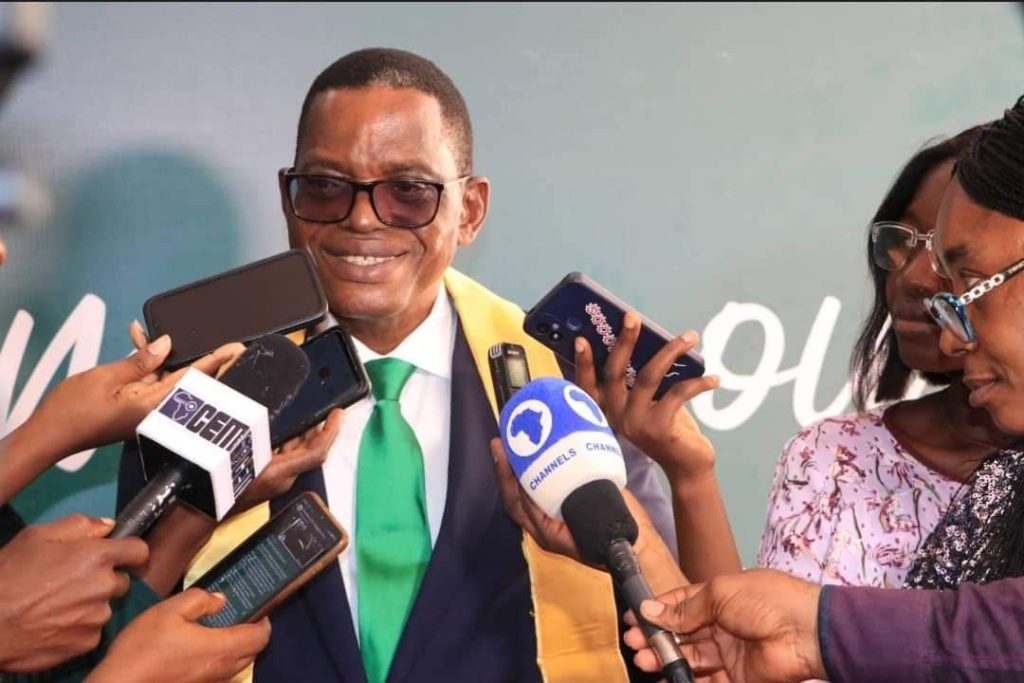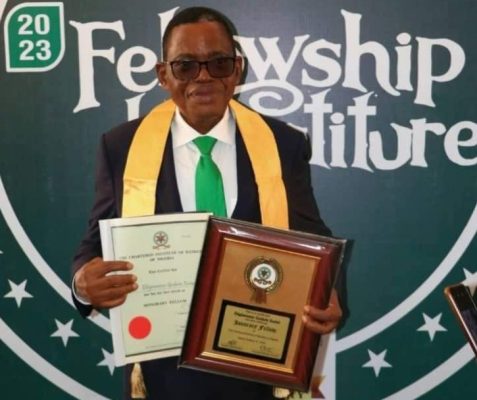By Carl D Maduneme
Godwin Ehigiamusoe, Chairman of LAPO Microfinance Bank and founder-strategist behind the LAPO Group which is making impact in many sectors of Nigeria’s socio-economy is a simple man with a profound vision. It shows in his style. The Edo-born visionary favours almost nondescript suits and communicates in the simple but rigorous manner of a university teacher or researcher to whom imparting knowledge is both a duty and a passion. Thoughtful and highly cerebral, he prefers to leave the centre stage for the many talents he has groomed and let his results do the talking. But make no mistake: he is also a revolutionary in the best sense of the word.
In over forty years on the frontlines and trenches of Nigeria’s social enterprise and economic empowerment arena, Dr Ehigiamusoe has played a leading role in transforming the landscape from an individualistic and whimsical sphere into a more structured and impactful one which is making a significant difference in businesses and communities across the nation. Imbued with a vision to lift those at the lower end of the economic spectrum, he has led from the front, a trail blazer who has not only shown the way to others but offers his intellect and experience as a beacon for them to see the way.
Ehigiamusoe is both a thought leader and active participant, a thinker with an impressive record of consistent and strategic action. The scale of what he has achieved is reflected in the fact that LAPO Microfinance Bank with over 7000 employeees is, according to a study by Statisence, one of the country’s top five employers, ahead of popular commercial banks and the Dangote group. But this is just one index of his impact. There are many others.
From the start, his vision was a comprehensive one. As he explained in a documentary chronicling LAPO’s origins and rise: “By the time I was stepping out of the University, I had clarity of what poverty is and how it can be effectively addressed. First I conceived and indeed conceptualize poverty as an octopus with three basic tentacles namely the tentacle of material deprivation, that is not having money. The tentacle of poor health and the tentacle of social exclusion.” The growth of the Group which includes a specialist hospital in Benin has reflected this simple but expansive conception of poverty.
The largeness of Ehigiamusoe’s heart, his immense capacity to feel the pain of those at the receiving end of society’s neglect and cruelties is well known to those who have crossed his path. But what really stands him out is his exceptional capacity to go beyond feelings, beyond the instinctive humane response and transform empathy into practical structures and corporate cultures that give sustainable support to those in need. This is amply demonstrated in the robust strength and durability of the structures that he has founded and nurtured in many areas. LAPO Microfinance Bank, the country’s largest microfinance bank is the best-known example.

But there are others: LAPO Institute for Microfinance and Management Studies, the Benin Medical Centre, Micro Investment Support Services etc. The visionary is also a strong corporate player who has guided LAPO Microfinance Bank, twice, to the capital market and the enthusiastic reception of the market is an expression of how far institutions supporting social enterprise have come since Ehigiamusoe embarked on the journey over four decades ago.
The recent award of the prestigious title of Fellow to Ehigiamusoe by the preeminent umbrella body of professional bankers, the Chartered Institute of Bankers of Nigeria, is a confirmation of Ehigiamusoe’s sterling achievement in building sturdy corporate frameworks around social enterprise which have sustained and empowered millions of Nigerians across the country. The award is also a tribute to the passion and hard work of the institution’s staff who are providing financial services to over five million beneficiaries in about 535 locations across the country with a total loan portfolio of over $400m.
Nigeria has never been short of people with compassion or, its less stellar version, pity. Our society – at the cultural and spiritual levels – has always had a significant representation of the “love thy neighbour” ethos. We have our fair share of the humanistic instinct as demonstrated in the virtues that are common in our fables, in the moral principles which animate our community ethics and our spiritual beliefs. Supporting the weak and lifting up the fallen are an organic part of our societal ethos. But while individual and community efforts to live out these principles in rural settlements and urban centres are important, the truth is that they are not always enough. Sometimes the sheer weight of need is so great, that the everyday day good neighbourliness is simply inadequate to cope with the challenges.
The implementation of the Structural Adjustment Programme by the Babangida regime in the middle and late nineteen eighties is an example of one such period. The Programme’s official objective was to restructure and grow the economy by reforming the foreign exchange system, trade policies as well as business and agricultural regulations. But its real-life on Nigeria’s low income and middle class, it was devastating. Devaluation and high interest rates caused a steep decline in incomes and poverty rates soared. Hunger was on the prowl and millions of Nigerians had no one to turn to. Ehigiamusoe who had left the University of Benin with a degree in Sociology several years before SAP came calling was moved by the suffering. It was around this period that the seed which became LAPO was planted. READ ALSO:
- Governor Okpebholo Holds Steady Advantage as Edo Election Tribunal Progresses
- FAAC shares N1.424trn December revenue to FG, states, LGs
- Tinubu Commends Nigerian Governors For Supporting Tax Reform
- Tax Reform Bills: Zacch Adedeji, The Man Of Steel
- Breaking The Cycle: How Nigeria’s Economy Shapes Democracy
The beginning was typical of Ehigiamusoe, dramatic in its simplicity. Having been persuaded by study and practical observation that sustainable empowerment cannot be achieved by charity but through targeted low interest loans, he decided to take action. The first beneficiaries were three hardworking women in his local church who received N100 each.
From this first step, he built brick by brick, that strong network of support that became Lift Against Poverty Organization (LAPO), the historic precursor to LAPO Microfinance Bank and the other components of the LAPO Group. On the way, Ehigiamusoe received initial support from an international foundation and obtained significant inspiration from the example of Nobel winner Muhammad Yunus of Bangladesh. The dream has grown into one of the most transformative social enterprise interventions in post-independence Nigeria. And that’s why this simple man with the humane yet rigorous vision deserves to be celebrated.
*Maduneme is a public affairs analyst.


